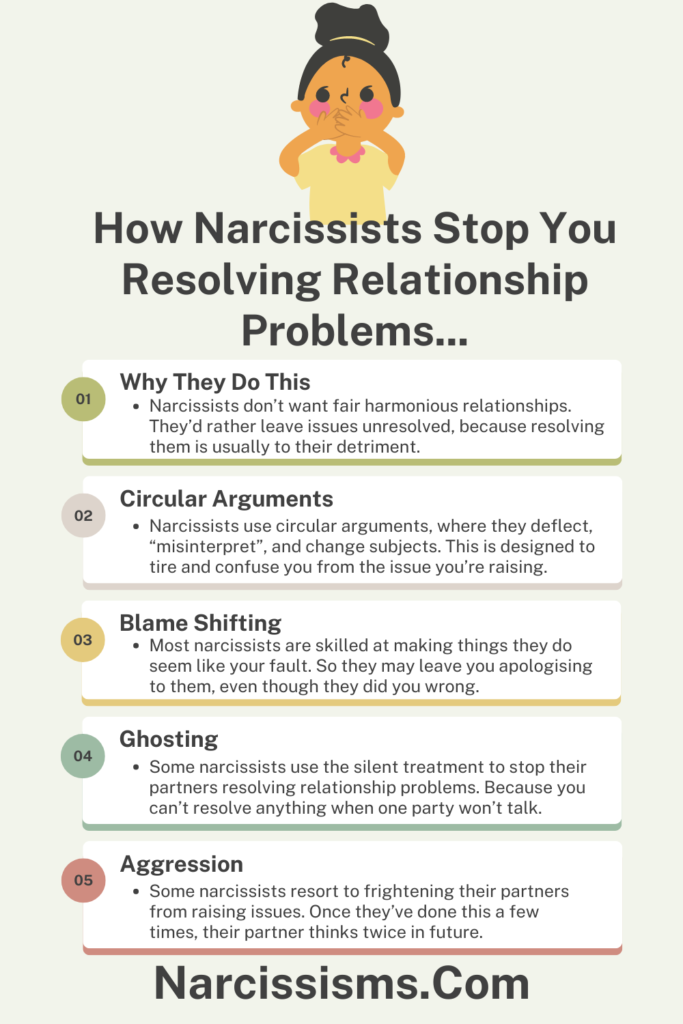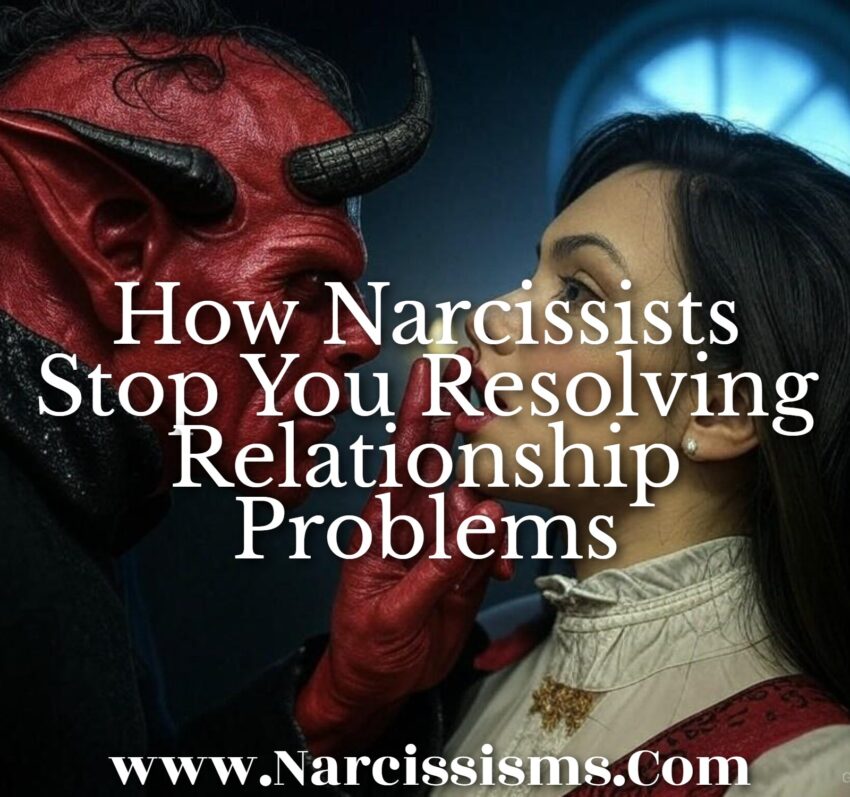Most neuro-typicals seek harmony. They strive for peaceful resolutions to relationship problems. And aim to keep things fair and balanced, in the name of diplomacy. But narcissists don’t do this.
Narcissists LIKE conflict and turmoil. They love the drama because it warms their cold blood. And they don’t want resolutions, because deep down they know THEY are the problem.
Narcissists aim to take as much as they can from relationships. They don’t want transparency and fairness. So they keep relationship problems unresolved when they’re the cause. Then the real issues are hidden within a toxic mess. And they can continue to take advantage of their loved ones.
As you probably know, it’s highly frustrating when you can’t resolve things with a narcissist. Unless you back down and concede all the ground. And doing this gradually reduces your power in the relationship. And increases theirs.
Narcissists are sly, and they develop many tactics to stop you resolving relationship issues. And some of their tactics leave you confused and unsure who’s to blame.
In this article I’ll discuss how narcissists stop you resolving your relationship problems. And once you learn their tactics, you’re better equipped to defend yourself. And see what they’re really up to. Then you know you’re not going mad!
Here’s what narcissists typically do to stop people resolving relationship problems with them…
Please Check Out This Short Video To Aid Your Understanding…
Circular Arguments
One of the most annoying things narcissists do is engage in circular arguments. This is where they avoid the issue raised. And instead drag you on a merry-go-round of words, deflections and deliberate misinterpretations. Here’s an example of a narcissists’ circular dialogue…
“You think of me as your servant. Can’t you do it yourself?”
Narcissist – “I never said you were my servant!”
“I know you didn’t SAY that. But you keep trying to boss me around, and I don’t appreciate it.”
Narcissist – “Well I don’t appreciate you waking me up at the crack of dawn every morning.”
“That’s because I start work early. I try to be quiet, but you’re a light sleeper. Anyway, like I said, please stop trying to order me around.”
Narcissist – “You’re always complaining. I can’t seem to do anything right. I don’t know why I bother.”
“I’m not always complaining. I’m just trying to tell you that I don’t appreciate being bossed around.”
Narcissist – “Then why are you so angry with me?!”
“I’m not angry. I’m trying to tell you something.”
Narcissist – “You’re always angry and bossing ME around. I’m sick of this.” And leaves the room.
If you’ve been in a relationship with a narcissist then you’re probably familiar with this type of interaction. It’s like shooting wasps with a handgun.
They won’t stay on topic, because deep down they know they’re wrong. If they wanted to be fair, and they knew they were right, they would meet the issue head on.
These conversations are draining, frustrating, and nothing gets resolved. And after a while, you learn that challenging them is not worth the hassle.

Blame Shifting
Narcissists are usually skilled blame shifters. This is where they shift the blame away from themselves, and onto others.
In the dialogue above, the narcissist shifted the blame by claiming their partner was angry with them. And made their supposed anger the focus of the discussion. This deflects attention away from the real issue – their behaviour.
This leaves their empathetic partners confused, and doubting themselves. And because they’re conscientious, they accept some responsibility for what’s gone wrong. And the real problem remains unresolved.
Other Blaming Tactics
The narcissist may also blame their upbringing for their behaviours. And use it as a reason why they can’t (or rather won’t) change.
This also works as a pity play, because their empathetic partners feel sorry for them. And understands it’s not their fault how they were brought up. So they make allowances for them. And if you give a narcissist an inch, they take a mile.
The narcissist may also blame mental health issues, such as depression, stress, or anxiety. And this leaves their understanding partners feeling bad for them, despite receiving bad treatment.
Once the narcissists establishes that their abusive behaviours are not their fault, they have a free pass to do what they please. Because their partners feel bad for challenging them.
Ghosting
Some narcissists resort to silent treatment to stop their partners resolving relationship problems. Especially if their other tactics fail.
Refusing to speak makes it impossible to resolve anything. And they create an atmosphere you can cut with a knife.
Narcissists can keep ghosting up for days, because they like the power associated with people walking on egg shells around them. And their silence makes life a misery for everyone else.
This tactic stops them having to fight a losing battle. Because they don’t need to defend their bad behaviours when they’re silent. And their loved ones are usually so glad when they finally decide to speak, that they don’t want to stir the hornet’s nest by continuing the discussion. So it’s case closed.
Aggression
Some narcissists become aggressive when relationship problems are raised. And intimidate their partners into staying silent.
The may use verbal or even physical aggression. And of course if they regularly display this, their partners fear bringing up relationship issues in the future. Because they know what’s coming.
Ridicule
Some narcissists ridicule their partners when they try to raise relationship problems. They may for example accuse them of being a moaner or negative.
Narcissists often find something their partner doesn’t want to be associated with, then ridicule them for that. For instance, if their partner has issues about getting older, the narcissist may accuse them of sounding like “an old bat” when they try to resolve relationship problems.
This ridicule is designed to embarrass their partners out of confronting them. And allow them to continue their bad behaviours.
Final Thoughts
Most narcissists use a combination of these tactics to stop their partners resolving relationship problems. When one doesn’t work, they switch to another until they find one that does.
People who’ve never been in a relationship with a narcissist find it difficult to understand why you can’t discuss your relationship problems with them. And may say things like “just tell them”. But as you and I know, it’s not that simple.
When friends and family don’t understand your situation, this adds to the frustration. And can leave you wondering whether you’re losing your mind. This is why therapy might help you. Because it’s important to be able to discuss your concerns to someone who will actually listen.
But if a narcissist has a problem with you, then you can bet your life they’ll bring it up. And want a full resolution.
A quick way to get through to a narcissist is to turn your complaint into a positive. For instance, if you’re sick of their back seat driving, then say something like, “I’m not as good a driver as you, please give me a break”.
This is much more likely to be accepted, because narcissists will always listen to a compliment. And bask in the glory, barely noticing that you’ve coaxed them into modifying their behaviour.
But if you tell them you’re “sick of their back seat driving”, then expect one or more of the tactics I’ve discussed. And you’ll probably get nowhere.

Please CLICK HERE For Why You Feel Alone Around A Narcissist
Or Scroll Down For My Most Popular Posts (Mobile)…
Why You Feel Lonely With A Narcissist

I know these tactics very well. With your help and another’s I have been able to get my mind back from the abuse. Unfortunately my son is married to a narcissist and thankfully I am able to help him. Thank you for your knowledge.
So glad to help Connie. That’s great that you’ve passed it on. I truly believe that knowledge of narcissism can make the difference between living a good life and a rotten one.